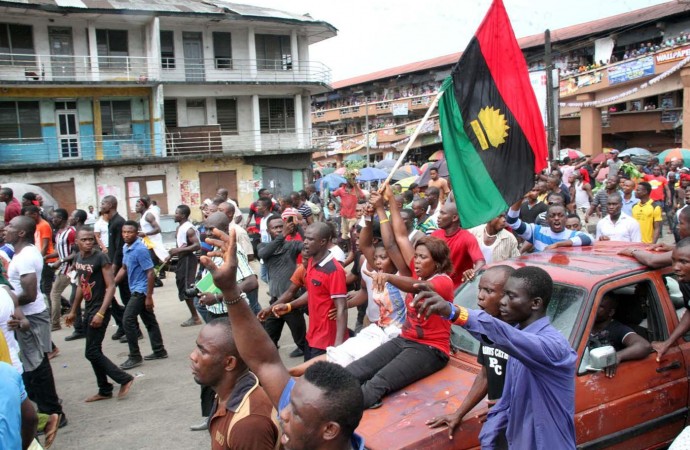SPECIAL REPORT: How ESN’s attack on Orlu market led to orgy of violence
IPOB says it formed ESN to protect rural Igbo communities but others accuse the armed group of armed robbery, murder of unarmed civilians, fatal assaults on the police and theft of weapons
On January 25, 2021, many Hausa traders in a market in Orlu, Imo State, barely had a moment to process what they were seeing as vehicles stopped with a screech, masked gunmen jumped off and started shooting directly at them. The gunmen later set the market on fire.
“We just saw about four vehicles with correct, correct guns, driving wrong-way towards where we were,” said Ahmadu Ali, a leader in the market situated just behind the town’s stadium.
“They just opened fire pa-pa-pa-pa; there was no stop.”
Mr Ali said three people were shot dead and one Salisu Sala was burnt. He said other traders escaped through the stadium road, many of them with gunshot injuries.
He named those killed in the unprovoked attack as Usman Ali, Mohammed Rabiu and Nura Muhammadu.
Except for Nura, who was from Nigeria’s northwestern Sokoto State, the other dead victims were from Niger Republic, although of Hausa ethnic stock.
PREMIUM TIMES obtained horrific photographs showing the victims, lifeless and drenched in blood, and their cleaned remains, prepared for burial.
Also, we received still and motion pictures of the razed market. Mr Ali explained that the market was razed as the fire from Mr Sala’s body caught inflammable materials in his shop and quickly spread to other shops in the market.
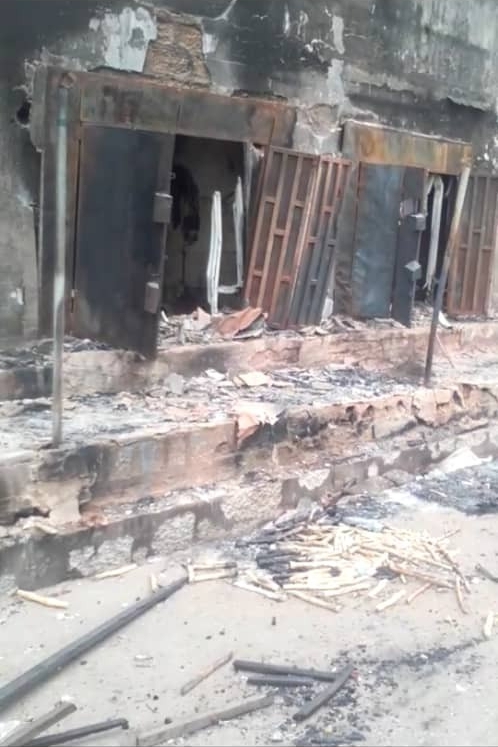
Burnt Hausa community market in Orlu, Imo State.
“They were quite a number,” said Golden Marvin, who said he witnessed the attack. Mr Marvin identified the gunmen as members of a militia group, Eastern Security Network (ESN), because of the “inscriptions on their vehicles” and their clothing.
His claim was corroborated by the police who said some arrested members of the group confessed to the attack.
Several residents interviewed for this report said they witnessed the killings of the Hausa traders and how their shops were looted and destroyed.
Survivors said there was no help from the police as the attack on the market went on. The police did not deny this claim.
Hausa traders are now unable to trade at the market, leaving many of them in hardship, Mr Ali said.
In February, when PREMIUM TIMES interviewed him, he said he had just arrived from the neighbouring Anambra State “to find something from my brother for survival.”

Salisu Sala, Hausa from Niger Republic, before he was set on fire in Orlu on January 25, 2021. Source: Hausa community.
“That was not the first time we would be attacked,” he said “But we don’t have a problem with anybody and those that died have passed. We just want to live in peace now. The government should protect us and support us to continue our trade.”
Since the attack on the market, at least 10 persons, including four soldiers and two women who were hit by stray bullets, have been killed in related violence in the town.
ESN is a new armed formation of the proscribed separatist Indigenous People of Biafra (IPOB) led by Nnamdi Kanu, seeking an independent state for the Igbo ethnic group from Nigeria. The separatists were initially unarmed and had been victims of massive extrajudicial killings by the armed forces and police between 2015 and 2016, a PREMIUM TIMES’ Global Shinning Light Award-winning investigation had uncovered.

Fatally shot Mohammed, lying lifeless. Source: Hausa community
IPOB’s lawyer, Ifeanyi Ejiofor, told PREMIUM TIMES that ESN was formed to protect rural Igbo communities against violent herders in the face of the government’s alleged abdication of its duties. But ESN is doing much more than that, state government, residents, and security officials said, accusing the formation of criminal activities, including armed robbery, the murder of unarmed civilians, fatal assaults on the police and theft of weapons.
“What I fear is one of the effects of insurgency, which is instability that affects business and leads to a rise in criminality,” said Cheta Nwanze of Lagos-based SBM Intelligence. “Essentially, the so-called ‘protectors’, in this case the ESN, turning on the very people that they claim to be protecting.”
How soldiers were killed
Before the attack on the Hausa market, the gunmen, who had emerged from the Okporo-Umutanze axis of the town, first attacked a local police station but were repelled.
But as the gunmen left the market, apparently driving off to disappear into the bush, which had been their fortress, they came in contact with a passing military vehicle. Soldiers told PREMIUM TIMES that the vehicle was not on a combat mission.
“The soldiers were ambushed and four of them were killed,” a military source briefed on the attack told PREMIUM TIMES.
Among the four fallen soldiers was Olaoluwa Adedeji, a band personnel, whose family in Ibadan, South-western Nigeria, was contacted by PREMIUM TIMES.
The Governor of Imo State, Hope Uzodinma, immediately declared a curfew and, based on his invitation, the 81 Division of the Nigerian Army sent reinforcements.
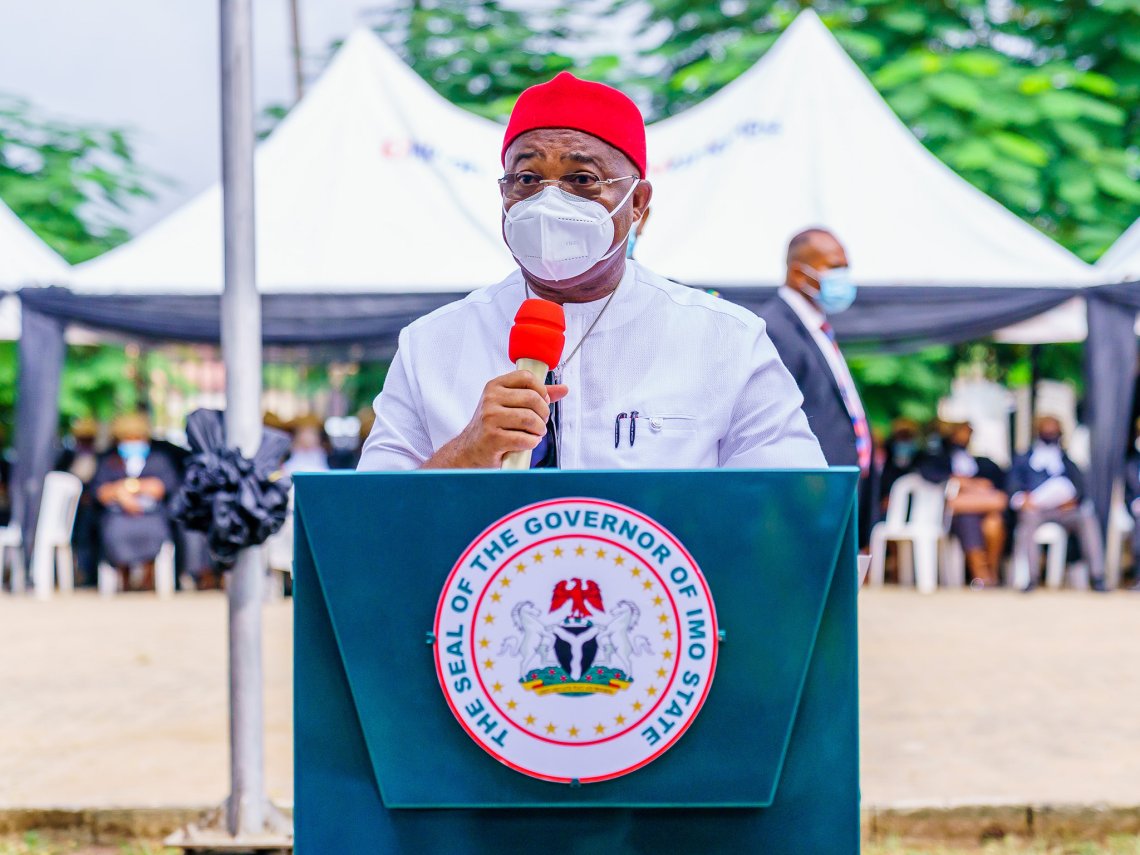 Imo State Governor, Hope Uzodinma [PHOTO CREDIT: @HopeUzodimma01]
Imo State Governor, Hope Uzodinma [PHOTO CREDIT: @HopeUzodimma01]
A storm of gunfire followed.
After the joint operation kicked off, reports were rife, especially on social media, that the military was also targeting civilians in the area.
Asked if he saw the army targeting unarmed people, Mr Marvin said, “No,” and added, “But there were cases of stray bullets hitting people.” Asked to comment if the stray bullets “hitting people” were from the army or the suspected ESN operatives, he said, “Not sure…wouldn’t want to lie.”
Abraham, a commercial motorcyclist in the town, who said he witnessed the incident, said he saw two women killed by stray bullets.
A soldier with knowledge of the military intervention in Orlu said, “It was an ambush, an attack and four soldiers, out of others in the vehicle, died. There’s no way something like that would happen without the Nigerian Army sending out soldiers to rescue their remaining men and when it happens like that anything could be done, you know.”
The joint military operation that followed the killing of the soldiers has left some with fears Nigeria now has another armed group to engage, apart from terrorists and bandits tearing the country’s north. But analysts and security sources say the eastern threat is unlikely to be as disastrous as those in the North.
How hell was let loose
Although largely unknown to the public; that late January violence, as well as the immediate background to it, offered the largest measure of the increased radicalisation of the separatists, who state security and intelligence community believe are behind the rising cases of fatal assaults on the police in the south-eastern region.
The army and the police on one hand, and the ESN on the other, had had confrontations on a number of occasions but the closest before the January 25 violence was a military operation against the separatists at the end of the previous week.
Officials directly briefed about the operation said the army had gone to the bush where ESN operatives were camping, “to dislodge them.”
“So, the following Monday (January 25), they came out for reprisal,” said one of the officials, asking not to be named for lack of authority to speak to the press. “They had wanted to attack the police station but they were repelled before they went to attack the Hausa traders, killed four of them and set their market ablaze.”
But before the army “took the operation to dislodge them,” police had lost officers and weapons in attacks by the suspected ESN operatives, according to security sources.
According to a police record reviewed by PREMIUM TIMES, the police had suffered losses at least three times between December 24, 2020 (less than two weeks after ESN was inaugurated) and January 5. The police’s own record shows how weak the force had been in responding to ESN threats, resulting in yielding the ground to the army to lead.
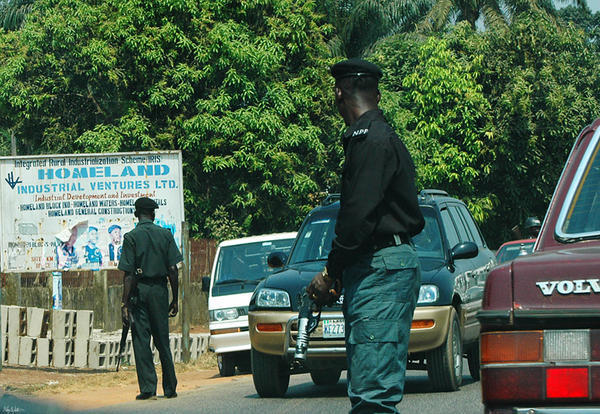 Nigerian Police officers on duty
Nigerian Police officers on duty
One, the attack of December 24, 2020, left two police officers at a checkpoint dead from gunshots by suspected ESN operatives chasing a man, who was said to be driving a Lexus car and had gone to withdraw money from the bank, according to the record. The man was also killed by the suspected ESN operatives, who were alleged to have also taken away the rifles of the cops, according to the record.
Two, on December 27, 2020, two other police officers were shot dead and their rifles stolen at a checkpoint allegedly by ESN operatives, who were also accused of killing a civilian and stealing his car.
The third incident was on January 5 when Mobile Police personnel, who had chased suspected ESN operatives after “they collected a car from another man and moved to Okporo/Umutanze area,” were killed and their rifles stolen.
“While all these were going, the police were gathering intelligence based on which two men were arrested,” a senior police officer told PREMIUM TIMES, speaking to the record also reviewed by our reporter. “The two persons confessed to being IPOB and ESN members and they led the command operation to their camp somewhere around Okporo and Umutanze.
“A gun duel ensued and police retreated. But they killed a policeman and seized two rifles and two vehicles, one of which they burnt.
“Then, soldiers intervened to lead, while the police withdrew from the front to focus on intelligence,” the police source said. “That was the reason the army took that operation to dislodge them before their (ESN) reprisal of Monday, January 25.”
What’s fueling IPOB-ESN?
The renewed separatist struggle comes decades after the late Emeka Odumegwu-Ojukwu led the Igbo to pursue secession from Nigeria. The secession failed after a humanitarian disaster and millions of lives lost in a 30-month fratricidal war (1967-1970).
However, with Biafran sentiments undying among many Igbo, Mr Kanu formed IPOB in 2012 but gained significant prominence after the inauguration of President Muhammadu Buhari in 2015.
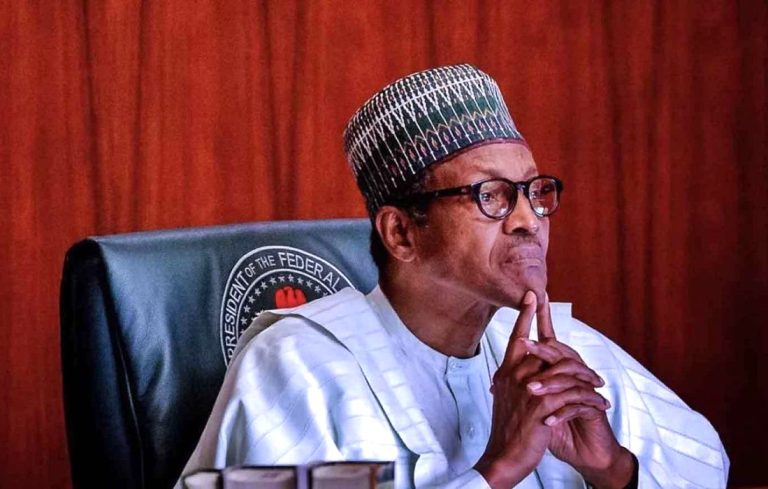 President Muhammadu Buhari
President Muhammadu Buhari
Barely two years after his inauguration, Mr Buhari was speaking at the United States Institute of Peace in Washington DC, where he infamously said the part of the country that “gave me 97 per cent cannot be treated, in all honesty, the same way with the constituencies that gave me only five per cent.” The president was making an apparent reference to the outcome of the 2015 presidential election in which the South-east and the South-south massively supported his opponent and then incumbent, Goodluck Jonathan.
Seemingly divisive statements such as that made in the U.S. and perceived nepotism in filling political and security command offices may have provided Mr Kanu with some points to inflame intense secessionist passions, observers say.
Other factors, according to observers, such as the Buhari administration’s perceived bias in handling the troubles associated with herders – mostly of the same Fulani ethnicity as Mr Buhari – contesting for space with farmers, and deepening socio-economic hardship may have also helped Mr Kanu, known for his fiery commentaries and conspiracy theories.
Mr Kanu, a British-Nigerian, fled Nigeria after he was released on bail, in September 2017 amid a major standoff between the separatists and the army in his home state of Abia. It was then IPOB was proscribed and pronounced a terrorist organisation. His trial for treason remains open. But it appears the separatists are getting more radicalised and Mr Kanu remains popular among a significant number of Igbo youth.
 Nnamdi Kanu
Nnamdi Kanu
“The main problem with the ESN, from my point of view, is a combination of frustration at governance and high unemployment, which has created a fertile ground for a demagogue to take root,” said Mr Nwanze.
“Unfortunately, the high-handedness of the federal response coupled with its one-sidedness in dealing with the various issues facing the country have effectively silenced voices in the South-east that would hitherto have provided a counterweight to the narrative pushed by IPOB, thus giving them more latitude than they’d have had a decade ago.”
During ground reporting in Imo State, while residents expressed concerns with the activities of the ESN, affirming they were involved in violence and criminal activities, some said they were self-conflicted, accusing the government of political marginalisation and failure to check herders’ aggression.
“We perceive their violent activities,” said Aloysius, an Orlu resident, who asked for his full name not to be used in this report over concern of being attacked by IPOB loyalists, referring to IPOB-ESN and highlighting their “strikes” targeting police and civilians. “But our people are crying over the menace of the Fulani herdsmen and the South-east has been politically marginalised.”
Stating further, Mr Nwanze said, “The data available to SBM shows that the South-east is still the least violent of Nigeria’s six geopolitical zones, but the army’s reaction in the region has always been overbearing, essentially feeding a vicious cycle. The region is ill-equipped for a battle of attrition, and if this situation deteriorates even further, Ndị Igbo will be the loser.”
Asked if he fears an insurgency could be emerging in the South-east, he said, “No, I do not fear an insurgency in the South-east because I don’t think it will happen.
However what I fear is one of the effects of insurgency, which is instability that affects business and leads to a rise in criminality. Essentially, the so-called “protectors”, in this case the ESN, turning on the very people that they claim to be protecting.
“As has happened with Amotekun in the South-west and the various Hisbah forces in the North, the ESN in the little time they have been around have shown that they are badly trained and have no idea of what due process and rule of law mean.
“The difference between them on one hand, and Amotekun/Hisbah on the other, is that they are non-state actors, so no one can put pressure on any state government officials if there’s a need to check them. It is only the FG that can act, and the current FG’s kind of reaction is always going to risk escalating the situation.”
“With strong response”
Since the January 25 violence, soldiers and police officers have continued to occupy the streets of Orlu and the military has conducted aerial operations to target the ESN operatives in Imo and neighbouring Anambra State.
Army spokesperson, Mohammed Yerima, did not categorically affirm there is an ongoing military operation targeting the ESN but he said, “If any group or subversive element is threatening the peace of the country and killing people, certainly the security will not fold their arms and look away. We must act.”
 Troops of the Nigerian Army. [PHOTO CREDIT: Official Twitter handle of the Nigerian Army @HQNigerianArmy]
Troops of the Nigerian Army. [PHOTO CREDIT: Official Twitter handle of the Nigerian Army @HQNigerianArmy]
But the police spokesperson for Imo State, Ikeokwu Orlando, said, “it is a national issue. A not-so-full operation is ongoing and the army is leading.”
He said at least 15 members of the ESN had been arrested, with stolen rifles recovered.
IPOB’s lawyer, Mr Ejiofor, denied allegations that ESN had been involved in criminalities and said the military operation was in response to the ability of the ESN to check the herders.
“The federal government and the willing hand they have in Imo State don’t want that to happen, they don’t want herders to be stopped from killing our people,” he said. “The military should rather be deployed to where bandits have overrun in the north.”
But officials in the country’s security and intelligence community said the ESN had only emerged under the guise of protecting the people against herders.
“What’s the significance of the herdsmen’s violence in the South-east? ESN say they are protecting the people but they mask themselves, stay in the bush and only come out to attack people and the police and steal police rifles,” one official, an intelligence agent working on ESN matter, said.
“They are kept in the bush with weapons. Of course, their material needs would press them to go use the weapons to satisfy their needs. Who is feeding them, who is paying them and how are they getting their weapons, apart from those stolen from the police?”
However, the country’s security and intelligence community believes that with a “strong response” by the government, IPOB-ESN cannot present a significant threat compared to Boko Haram in the North-east or armed bandits in the North-west, the agent said, giving four reasons.
“One, the South-east does not have the kind of large forests that can aid guerilla warfare. Two, an Igbo does not have endurance like the Fulani and does not want to die. They easily confess and give out their own comrades and reveal their camps, with minimal force.
“Three, the South-east does not lie on land borders; so, that makes arms importation difficult for them and we think that is why they are attacking the police to steal weapons. Four, the neighbouring ethnic groups that have international borders like in Cross River State may not cooperate with them,” the agent said.
But Mr Nwanze canvassed job creation for the youth, not only in the South-east but nationwide, to deny “drivers” of trouble easy recruits as foot soldiers.
Nnamdi Obasi of the International Crisis Centre said the evolution of the threats from the South-east would depend on the government’s handling.
He advised against a “high-handed indiscriminate military operation” but stressed that attacks on the police must be “totally” stopped with “targeted response to actual people behind the attacks, not indiscriminate operation.”
Culled from from Premium Times

